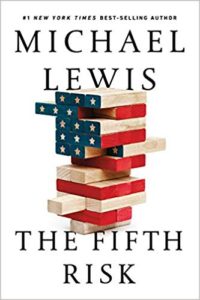
Is our government too bloated, too intrusive, too expensive?
Is it a “swamp” that needs to be drained if we are to survive?
Michael Lewis, the author of such jewels as Liar’s Poker, Moneyball, The Big Short, Flash Boys (see my review of 12/15/2014) and The Undoing Project (see my review of 1/22/2018), has been stimulated by the election of Donald Trump and Trump’s “willful ignorance” and “subsequent incoherence” to step back and take a serious look at a few departments of our government.
Lewis has selected the work of the Departments of Energy (controlling nuclear waste), Commerce (predicting the weather), and Agriculture (assuring food safety), and using in-depth discussions with selected government servants illustrates what is seldom acknowledged – the long-term contributions of much of what goes on at the federal level.
Part of the problem in Lewis’ word is that we have ”two million federal employees taking orders from four thousand political appointees. Dysfunction is baked into the structure of the thing …”
He leads this analysis with the words of John MacWilliams, the Department of Energy’s “first ever chief risk officer.” MacWilliams offers his top four risks as the threat of nuclear disaster, North Korea, Iran, and protecting our electrical grid from cyber-terrorism.
But topping all four is the broader inadequacy of “project management” in the US. MacWilliams states, “managing risks (is) an act of the imagination. And the human imagination is a poor tool for judging risk … They (humans) are less good at imagining a crisis before it happens—and taking action to prevent it.”
Lewis goes on to explain, “ … the risk a society runs when it falls into the habit of responding to long-term risks with short-term solutions,” results in, “ … the innovation that never occurs, and the knowledge that is never created.” He concludes, “We need doubtful and forever curious students of possibilities.”
Lewis’ answer is that the long-term and continuing government work of managing the risks of nuclear waste, unusual weather, and food safety has been successful … if not exceptional.
But is this work threatened by the current administration?
To Lewis, “Trump’s budget … is powered by a perverse desire—to remain ignorant.” And that seems to have led to “a rift in American life … between the people who are in it for the mission and the people who (are) in it for the money.”
So what is “risk”?
Lewis quotes David Friedman, of the National Oceanic and Atmospheric Administration (NOAA), who says, “Risk is uncertainty about the outcome.” We can never be certain of what will occur, but we can certainly try to be.
And that leads to his final sentence, “It’s what you fail to imagine that kills you.”
A most provocative and coherent analysis.
Editor’s Note: ‘The Fifth Risk’ by Michael Lewis is published by W. W. Norton, New York 2018.

About the Author: Felix Kloman is a sailor, rower, husband, father, grandfather, retired management consultant and, above all, a curious reader and writer. He’s explored how we as human beings and organizations respond to ever-present uncertainty in two books, ‘Mumpsimus Revisited’ (2005) and ‘The Fantods of Risk’ (2008). A 20-year resident of Lyme, he now writes book reviews, mostly of non-fiction, which explores our minds, our behavior, our politics and our history. But he does throw in a novel here and there. For more than 50 years, he’s put together the 17 syllables that comprise haiku, the traditional Japanese poetry, and now serves as the self-appointed “poet laureate” of Ashlawn Farm Coffee, where he may be seen on Friday mornings. His late wife, Ann, was also a writer, but of mystery novels, all of which begin in a village in midcoast Maine, strangely reminiscent of the town she and her husband visited every summer.